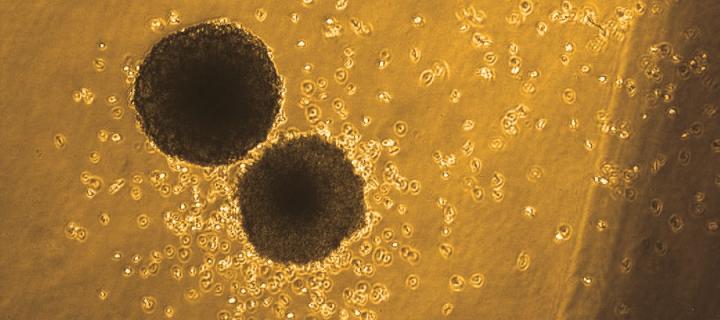Cancer study identifies genes that stop onset of Leukaemia
Genes that act as brakes to stop the development of an aggressive form of leukaemia have been identified by researchers at the University’s MRC Centre for Regenerative Medicine and the Edinburgh Cancer Research Centre.

Their findings offer fresh insights into how to tackle the disease and could lead to new therapies that prevent relapses.
Molecules Hif-1alpha and Hif-2alpha stop leukemic stem cells
Scientists have found that two molecules – Hif-1alpha and Hif-2alpha – work together to stop the formation of leukemic stem cells in an aggressive type of blood cancer called Acute Myeloid Leukaemia (AML).
2500 people diagnosed every year
Around 2500 people are diagnosed with AML in the UK each year. Chemotherapy drugs can help to eliminate Leukaemia cells but have no effect on leukemic stem cells that cause the disease. This means the disease sometimes relapses.
University of Edinburgh study
The cancer occurs when production of new blood cells by the bone marrow goes awry. This leads to the formation of leukemic stem cells, which fuel the disease and provide a constant flow of abnormal Leukaemia cells. The University of Edinburgh study shows that blocking Hif-2alpha – or both Hif-1alpha and Hif-2alpha – accelerates the development of Leukaemia.
Surprise findings
The findings are surprising because previous research had suggested that blocking Hif-1alpha or Hif-2alpha may stop Leukaemia progression. Researchers say that their new results suggest that therapies designed to block these molecules may have no impact or could even worsen the disease. Conversely, designing new therapies that promote the activity of Hif-1alpha and Hif-2alpha could help to treat AML or stop the disease from recurring after chemotherapy.
Our discovery that Hif-1alpha and Hif-2alpha molecules act together to stop Leukaemia development is a major milestone in our efforts to comat Leukaemia. We now intend to harness this knowledge to develop curative therapies that eliminate leukaemic stem cells, which are the underlying cause of AML.”
Dr Milica Vukovic, first author of the study, said: “Leukaemia is an umbrella term for a vast number of very complicated and different diseases. Given our findings implicating Hif-1alpha and Hif-2alpha as tumour suppressors in AML, it would be very interesting to investigate their roles in other leukaemias.”
The study is published in the Journal of Experimental Medicine. It was funded by Cancer Research UK, Bloodwise, the Kay Kendall Leukaemia Fund and the Medical Research Council.
Read the article in full
Read more on the Journal of Experimental Medicine website
Study funders

